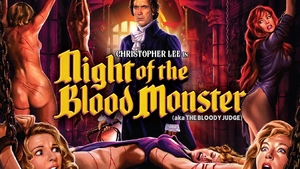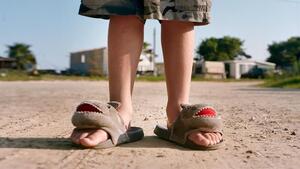
Hold Me Tight
directed by Mathieu Amalric
starring Vicky Krieps, Arieh Worthaler, Sacha Ardilly, Anne-Sophie Bowen-Chatet
As the feminist movement gained global traction in the 1960s, cinema responded in kind by producing countless stories of women rejecting traditional familial and/or societal constructs. Beginning with films such as Alessandro Fallay’s Le altre from 1969, the subsequent decade would see a wide array of international works such as Agnès Varda’s One Sings, the Other Doesn’t, Martin Ritt’s Norma Rae, and Gillian Armstrong’s My Brilliant Career, motion pictures that suitably depicted the modern struggles of women trying to take on a leadership role at the workplace or simply rejecting the institution of marriage.
Although set in present day, Mathieu Amalric’s engrossing and perplexing new film, Hold Me Tight, opens with a shot of Clarisse (Vicky Krieps) sitting alone in her bed surrounded by anachronistic Polaroid photos, which she uses to play a Hūsker Dū-like memory game before belting out the words, “Let’s start again!” The film then cuts back to an idyllic farmhouse in the hours near dawn where we observe Clarisse writing her family a note, making breakfast for her kids, and then collecting her effects and throwing them into her astonishingly well-kept, late 1970s AMC Pacer. In embedding this opening scene with key cultural and period identifiers, Amalric quickly takes us back to the aforementioned era of feminist cinema, and to a subgenre of films that saw wives and mothers making the painful decision to abandon their families. However, unlike Kramer vs. Kramer’s Joanna, who walks out in the opening act, we are not entirely sure of Clarisse’s intentions as she makes her way out of town.
Upon discovering his wife’s disappearance, Marc (Arieh Worthaler), begins to care for his young children Paul (Sacha Ardilly) and Lucie (Anne-Sophie Bowen-Chatet), who painfully come to grips with what their mother has done. However, is this all actually happening? As we watch Clarisse, she visualizes what will be said by each member of her family about her exodus, but when her thoughts seemingly become exact actions, we enter a realm that intentionally blurs fact and fiction. Subsequently, when Clarisse drives to the snow-covered chalet where rescuers tell her that her family has disappeared in the aftermath of an avalanche and that they cannot begin to search for them until the spring thaw, we question whether this entire tragic incident is a delusion for Clarisse to relieve her guilt for shedding her future as a mother and wife, or if it is the true reality and her vision of leaving her family behind is a protective fantasy to avoid the trauma of losing her loved ones to a natural disaster. Clarisse returns to her empty home, and, while there, she refuses to directly confront the potential of a devastating outcome, opting instead to drum up her past, like the night when she met her husband. She also delves deeper into imagining how her family will progress without her, which further obscures the lines between reality and delusion while building two versions of Clarisse that serve as each other’s foil.
There is a symbiosis between denial, projection, and rationalization to the stages of grief that occur within and across Clarisse’s two states. As she initially pulls away from the grief-stricken present where she’s the only one left, she imagines a utopian outcome for those left behind in the present where she’s the abandoner. But as the spring approaches and the inevitable weighs on her mind, a more lucent, accurate perception emerges alongside a self-realization that her grand hopes and goals for them may have resulted in a less than perfect future for everyone.
While speaking at Film at Lincoln Center’s 27th edition of Rendez-Vous with French Cinema, Amalric expressed his almost twenty-year-long admiration for Claudine Galea’s play, Je reviens de loin (I’ve Come a Long Way), which he adapted for his screenplay. “It is a play of inversions,” claims Amalric, “if you leave, you’re staying.” During that conversation, Amalric detailed his desire to work with Krieps after seeing her in Paul Thomas Anderson’s 2017 film, Phantom Thread, and she is brilliant in her role here, especially considering that Amalric insisted that his actors see the dialog only on the day of shooting in order to keep the reactions fresh and urgent, which provide a magnetic energy that engages and guides the viewer throughout Hold Me Tight, despite much uncertainty around Clarisse’s reality and the truth of events.
Naturally, Clarisse’s instability represented in the version of herself that runs away from her domesticated life, unprovoked by any particular event or cause other than an unspoken feeling of malaise and discontent, evokes the images and mood of Barbara Loden’s revered 1970 film, Wanda, in which our titular character also cuts out on her family without any clear rhyme or reason. Though Amalric draws us onto this familiar narrative path, as soon as you settle and begin to think you’ve seen Clarisse before and have some reference pattern for her seemingly erratic behaviors, he cuts to an alternate Clarisse, who is not a mother escaping a home, but instead a home that she has lost. In providing this recurring juxtaposition throughout Hold Me Tight, Amalric gives us the privilege of feeling all of the conflicting and disorienting emotions and reactions surrounding the loss of Clarisse’s family, be it by tragedy or her own departure, and by the end of the film, as the state-switches fade away, we arrive with Clarisse to a new state of clarity stemming from acceptance—acceptance for all that has transpired and all that was imagined, and acceptance of a new future completely divergent from her recent past.
Hold Me Tight is currently playing in NY and LA and is expanding to more theaters nationally on September 23 and 30, 2022.












